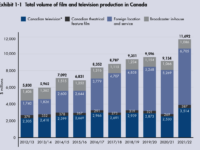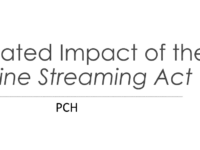The debate over Bill C-11 was frequently marked by politician and lobby group claims that failure to act would place the future of Canadian film and television production at risk. While internal government documents admitted that claims regarding the contributions from Internet streaming services understated the actual contributions by failing to account for “unofficial Cancon”, Canadian Heritage Minister Pablo Rodriguez was happy to feed the narrative that the bill was a critical support for an industry in jeopardy.
Profile 2022, the well-regarded annual report on the state of industry funding was released yesterday. It conclusively demonstrates that the claims on the state of Cancon production are wildly exaggerated. Indeed, the data speaks for itself: record production, record Cancon production, record French-language production. Over the past decade – as streaming services has grown in popularity, Canadian film and television production has more than doubled. The following three charts and graphics taken from the Profile 2022 report tell the story. There is no Cancon emergency and no risk to film and TV production in Canada. The Bill C-11 panic over the viability of the sector was little more than a fraudulent lobbyist-inspired talking point with little basis in reality.












